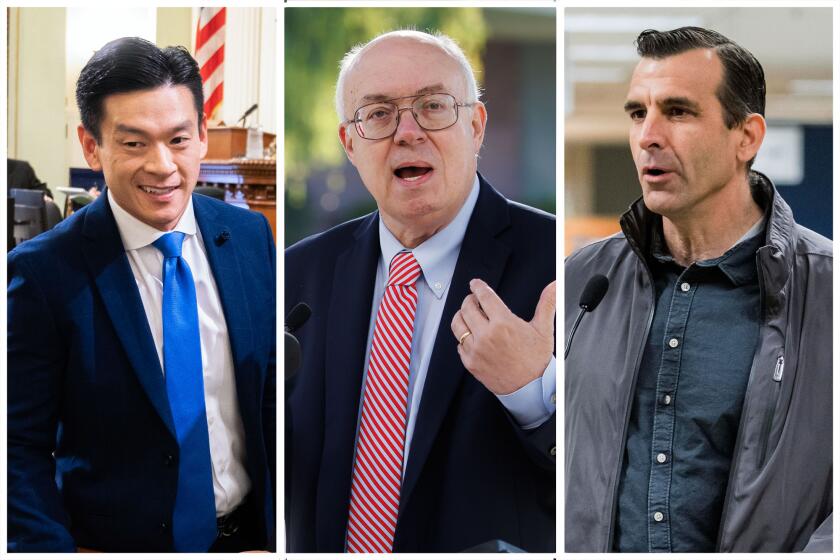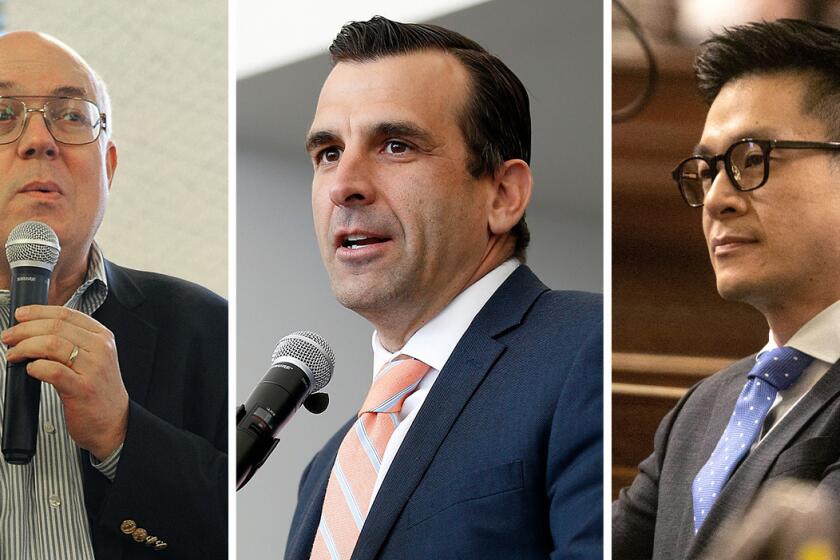Controversial recount breaks tie in Silicon Valley congressional race

After more than two weeks of recounting and several contested ballots, the verdict in California’s 16th Congressional District is in.
Democratic Assemblymember Evan Low has narrowly edged out Santa Clara County Supervisor Joe Simitian for second place, meaning Low will continue to the November ballot alongside first-place finisher former San José Mayor Sam Liccardo, also a Democrat. Low gained 12 votes during the recount and Simitian gained seven.
That shift gave Low a five-vote advantage, dashing Simitian’s chances of replacing retiring Rep. Anna Eshoo (D-Menlo Park) to represent a coveted, safely Democratic Northern California district.
The unprecedented second-place congressional tie meant that all three candidates would have appeared on the November ballot, had the results held. The three-way race would have been a first since the state shifted to its nonpartisan primary system in 2012, which dictates that the top two finishers advance to the November ballot regardless of party affiliation.
The extremely unusual situation comes after weeks of uncertainty, with Joe Simitian and Evan Low repeatedly trading positions behind Sam Liccardo.
Wednesday’s recount results come after an astounding month in Silicon Valley politics, with a race that has roiled local affairs, engendered an atmospheric river’s worth of mudslinging and added a layer of uncertainty to the coming general election.
“It is not unusual for a recount to change the vote totals, especially in such a large jurisdiction,” Santa Clara County Assistant Registrar of Voters Matt Moreles said Tuesday in a statement. “Because this contest was so close with two candidates precisely tied for second place, even tiny changes can make a difference in the outcome.” The district covers portions of Santa Clara and San Mateo counties.
The post-recount changes in the vote tally can be explained in a number of ways, according to the Santa Clara County elections office. In some cases, challenges were raised about a voter’s intent “when a ballot was marked in an unusual way,” which would then be up for interpretation. A number of ballots that were deemed ineligible in the original count were also challenged, with the county determining that seven of those ballots were valid and could be included in the recount. Human error also affected a very small number of ballots in the original count, such as with a 12-ballot batch that was processed but not tallied because an operator mistakenly pressed the wrong button after scanning them prior to the recount.
After trading leads several times, Simitian and Low each finished with 30,249 votes in the original tally, which was finalized earlier this month, shortly before the recount began. Liccardo finished with 38,489 votes, well ahead of the other two candidates.
Election officials in Santa Clara and San Mateo counties began their recounts on April 15, with various parties accusing each other of playing politics and trying to manipulate the democratic system.
Low initially tried to halt the recount through his lawyers, alleging that certain deadlines were missed, according to a letter obtained by the Mercury News. The effort was unsuccessful.
Under California law, any voter can request a recount so long as they are willing to pay for the costs. This particular request came from Padilla, a tech entrepreneur and onetime Liccardo campaign staffer who frequently posts about cryptocurrency and has been active in San José politics for decades.
A new independent expenditure committee called Count the Vote was created on April 9, the same day Padilla filed his recount request.
A recount in a Silicon Valley congressional race could theoretically put a kibosh on a three-way runoff in November.
Padilla told The Times that he had put “some” money into the PAC and that people who “had backed Sam in the past” and “were very concerned about democracy” had also put some money into it, but declined to share specifics, saying all would be disclosed in the next required federal filing in July.
Eshoo, the current occupant of the seat the candidates are vying to fill, attacked the opacity of the super PAC’s finances, with the Congress member saying “a dark shadow” would be cast across the landscape of the whole election without full transparency.
Another member of Congress, Rep. Ro Khanna (D-Fremont), took a hard swing at the recount itself, characterizing it as “a crass political ploy” and arguing that recounting all the votes would be an “undemocratic” attempt to overturn the will of the voters. Khanna endorsed Low, and Eshoo endorsed Simitian in the race.
The attacks reached a fever pitch late last month, when a local prosecutor filed a complaint with the Federal Election Commission alleging that Liccardo’s campaign illegally coordinated with “a newly formed dark money Super PAC to do his CD-16 recount bidding.”
Liccardo political consultant Orrin Evans said his candidate had nothing to do with the recount and characterized the complaint as a distraction that lacked any evidence.
The district Liccardo and Low are seeking to represent is overwhelmingly Democratic and encompasses parts of Santa Clara and San Mateo counties, including the cities of Palo Alto and Mountain View and part of the city of San José.
Santa Clara County accounts for the vast majority of the district’s voters, with about 82% residing there, while about 18% live in San Mateo County, according to California Target Book.
More to Read
Sign up for Essential California
The most important California stories and recommendations in your inbox every morning.
You may occasionally receive promotional content from the Los Angeles Times.













